#roman learns about fortunes and gods
Text
•°∆Looney Tunes Marvin the Martian headcanons∆°•

My brain is fucked, so I'm writing Marvin the Martian lore late at night. I'm forcing you to read my headcanons.
MARTIAN HEADCANONS
Words for a Martian child (and/or like- daughter or son or something): neonate, scion, larva, pupa, bairn, fledgling, successor, stock, begat, brood, young, hatch, posterity, spawn, progeny, sprog, raise, and xerox. (Xerox is very frowned upon, and you would be scrutinized if you refered to a scion, or any martian, as a xerox.)
Words for a martian "parent": guardian, forebear, roots, engender, begetter, wellspring, watch, exemplar, sire. (Sire is also frowned upon.)
Words for a Martian "sibling": issue, kin, rings, latches, gilds, heir, stock, cognate.
Most martians have a biological need to take care of their own kind. Larva specifically. And it has become law on Mars that once a martian who lives on Mars reaches 1,000 years old they must take in a larva as a progeny and raise it.
Neonates are born from martians, the same as all creatures, but not in the way you think. Martians asexually reproduce, but only during death. As the final stage of death, instead of decomposition, a new martian is born from their ashes and is taken to "The Stock Center" whenever found. (The stock center is essentially an orphanage.)
Larva are not copies of their predecessors, they often hardly ever have anything in common with their source. What mostly affect a pupa's mind and body is their environment. This is why calling a martian a "xerox" is scrutinized and offensive. A xerox is a clone. A copy. They are not copies. Martians don't have blood relatives at all. I put parent and siblings in quotes when saying the word meanings because that's not really what they are.
There are many neonates in the stock center, because that is where every martian "child" goes as soon as someone finds them. There are too many, which is why it is mandatory. Martians don't have children nor parents, but what they've made is close.
The stock center is like an orphanage, but doesn't function like one. Instead of the "parent" picking a child, the Larvae(baby-ish -> child-ish) and Pupae(preteen-ish -> teen-ish) pick their guardian themselves.
Martians who work for/have worked for the monarch wear articles of clothing similar to that of Mars: the Roman God of War. It is known to bring them good fortune and prosperity in their battles. The first time martians had invaded earth was in Rome, and they had taken to the clothing and culture quickly, quite a few even stayed to just study the earthlings. (I had learned that Marvin's helmet and skirt were based off of Mars, the Roman God of War. I knew his outfit was roman inspired, but I didn't realize it was because of the MARS GOD.)
What always bugs me about how Marvin is sometimes portrayed: he celebrates earth holidays, specifically Christmas is what I see most of. But he wouldn't. I mean he might have started to celebrate with others because he's been on earth, but he would not want to go home to mars for Christmas because he does not have holidays. So:
Martians don’t celebrate earth holidays or anything(Though Marvin does like to attend the occasional holiday party, just to catch up with his enemies and study traditions of earthlings.), but they do have celebrations on certain dates. The Forebears(The day where the scion chose their roots, it is celebrated every year, like a birthday), Spawn Raise(an informal term for The Forebears), Emor(Their first attack to Earth, martians soon learnt after this first attack that most earthlings write from left to right), Revital(A week off of duties, 4 times a year, it differs from everyone when it will be depending on their job, and obviously things will change for legionaries, auxiliaries, velites, hoplites and other soldiers, but it is a mandated honoring), and more that I have yet to come up with. These "Holidays" are called Honorings on Mars.
Martian gender/sex. Doesn't exist. They don't have sexes or gender. They're more like bees, there's always a queen, workers and drones. The "drones" are called Roman soldiers(will give a list of types of Roman soldiers later, and that will be what everyone is called depending on what the drones do.) Drones protect the queen and carry out their bidding. Then there's workers, those are ones who are sent out to gather recourses and information. Workers are called proles. Martian's bodies have nothing to do with gender, their forms slightly mimic their guardians as they are larva. It's only slightly though, and then their body grows on its own without mimicking their watch. Most martians are smaller, like Marvin, but many are still quite tall, like the queen. And how drones & proles are chosen, it is completely up to the queen. A variety of martians even bounce from drones and proles if it is necessary. Also, all martians use any pronouns. They don't even use pronouns, they simply call them by rank or name, I just use pronouns for ease and so that you understand who I mean-
Proles often keep "pets," to help them with retrievals.
(A Roman soldier could be called: A legionary, if he was a Roman citizen and an elite soldier who served for at least 25 years.(make that 2,500 years.) An auxiliary, if he was a non-citizen recruit or conscript who served for less pay and often in more dangerous roles. A velite, if he was a light infantryman armed with darts and a wooden shaft. A hoplite, if he was a heavily armed spearman. A specific name based on his function, such as accensus, actuarius, adiutor, aeneator, or agrimensor. Will probably work on these more, as I've gotten them straight from Google.)
MARVIN/X-2/MARCIA/MELVIN HEADCANONS
Marvin is over 2,000 years old(this is canon)
He has 2 larvae, Melvin (eldest) and Marcia(youngest).
Marvin is a prole who was ordered to work as a drone due to the wars, therefore earning his uniform. He returned to being a prole after the wars. X-2 has and always will be a drone. Marcia will be a prole when she grows up, and Melvin won't have a proper role in Mars, as he decided to do what very few Martians do: go out on his own before being given his rank.
Marvin did not choose to keep K-9, he followed him into his spaceship when he was a pup. Marvin has been taking care of him since he was 457.
Melvin had requested immediately upon becoming 550 years old, that he be allowed on his own to explore, and Marvin was hesitant, but eventually agreed, IF! Melvin and him built the rocket he uses together, and Melvin would have never turned that down, after-all, he wanted to be just like his begetter so why would he not want to spend time with him? (I don't know anything about Melvin, I haven't seen loonatics unleashed)
Melvin joined Marvin to see who would be his cognate, and y’know, watch the process. He still feels he’s far too young to become an engender, despite being roughly the same age as his own, so he was content with watching the process and watching his heir, Marcia, and his progenitor, connect.
Marcia is very different from Melvin and Marvin, but they adore her either way. She doesn't care for needless destruction, but she does see the art in what Marvin does, and finds it entertaining to watch him and “Duck Dodgers” fight on the rare occasion. They are very funny, and she likes how Marvin shows off his weapons.
X-2 has ran into Marvin once. They stared at each other in confusion for a minute before carrying on their way, some martians look very, very similar, and it can be disorienting at first but you get over it.
Duck Dodgers often confuses Marvin and X-2, and the Martians don't really tell him their different because they don't know that he doesn't know. He figures it out one time when he's fighting X-2 and calls him Marvin.
Marcia loves earthlings and longs to study everything about them and their planet, she got this from reading Marvin's old notes on his findings on earth before seeking to explode it. She asks him to take her down there and show her the world, and he begrudgingly agrees. He doesn't like being on earth after the few bad things that happened the times he were on earth, but he'd do anything for his spawn.
Marcia often wears earthling clothes, and tries to play the games they took from earth but you can't really play baseball without gravity. Cards were more fun, though!
Marvin is called Antwerp by friends, and enemies trying to anger him.
You ever go insane late at night and create culture for martians in looney tunes? I'm n o t okay-
#something something life grows from death and you needn't fear it#if you know for certain that flowers will sprout from the rubble of your grave would you not hesitate before digging up the past?#im not mentally stable#marvin the martian#marvin the martian commander#marvin the martian mars#Looney tunes#looney tunes marvin the martian#mars#marcia the martian#Melvin the martian#loonatics unleashed#tiny tunes#commander x 2
24 notes
·
View notes
Text
𓅨 Fortuna: Chapter One
Fortuna: Born with what seemed to be the worst luck in the world, you have managed to get into, and out of, life-threatening situations all your life. That is until the plague of 1514. You had escaped Mother Death countless times before, but not this time. Mother Death has taken a liking to you, and with your kindling relationship, you become that which historians whisper about. You are the great Fortuna, Goddess Incarnate of luck, and ruler over fortune and fate. No one could have anticipated what your ties with Death would bring you: Pain. Torture. Death. Love.
Warnings: None.
To Note: Morpheus/Dream x ImmortalSpanish!Reader, Reader’s nickname is Fortuna. Fortuna is the Roman Goddess of personified luck and ruler over fortune and fate.
Word Count: ~2.3k
Masterlist | Next


You were born under the rule of King Ferdinand II of Aragon and Queen Isabella I of Castille, in the great year of 1495 in a small mountaintop town by the name of Ronda. You had been a sickly child, always lagging behind others your age, constantly worrying the parents of Ronda. They say it takes an entire village to raise a child… well, it took the entire town to get you to live to adulthood. When you were ten and nine, a plague swept through the little village and you were one of many that it had taken captive. Only this time, the townspeople weren’t sure that you’d survive this malady. It was night eight of you resting in the sick house that she came to you, dressed in black wearing a strange cross around her neck.
You could have sworn you had seen the woman before, perhaps in passing. She radiated a calm and motherly aura, if not one of a friend. The woman sat down next to you and grasped your sweaty hand in a firm but gentle hold.
“I have been watching over you for many years, little Fortuna,” The woman spoke to you over the moans and groans of the sick around you. Your bleary eyes settled on her unfocused. “I’ve never met a human who found herself so close to death so many times before.”
“Have you finally come to take me then?” You rasped out, your mind slowly figuring out who and what she was: Mother Death. The local priest often warned the townspeople to pray to God every day lest they invite Mother Death to their doorstep… but you had only ever seen her in passing. She wasn’t someone you feared, she was more like an old friend.
“That is entirely up to you, my friend.” Mother Death replied with an equally soft smile. “You’ve been defying human nature since you were born. Is your desire for life one that you uphold most in the world?” Your eyes prickled with tears. You had clung to life for so long, defying all odds, simply because you wanted to live. To prove everyone wrong. To prove that you weren’t a hindrance that should have been left to the hills upon birth. But proving people wrong and living, were two entirely different things.
“I wish to see the world, and experience everything there is to life. I yearn for more than this protective bubble I live in, even if it is not for mine to yearn for. But if you should design to take me this time, then so be it. I think I’ve outlived my life long past.” Mother Death’s eyes crinkled and she held onto your hand tighter.
“And if I offered you an eternity to experience what you yearn for it, should you accept?” The true weight of Mother Death’s words was lost to your sick and fevered mind, but you responded with honesty.
“If I so had the chance, Mother Death, I should like to endeavor to walk this land for eternity until I learned of all its secrets, and even then I still wouldn’t be sated.” You whispered to her, your fevered mind fading to sickness. Mother Death continually held your small and shaking hand, satisfied with your response. She would gift you a life of undying, giving you a chance to fulfill that dream.

You had woken up from delirium, free of fever and sound of mind when all of the other sickened townspeople succumbed to the plague. Everyone called it a miracle and went about their days, you had survived yet another impossible sickness. This was nothing new. You remembered very little from your interaction with Mother Death, only little images here and there. Hints of a conversation about life. Your constant brushes with death. A gently aired offer of eternity that you would take in a heartbeat if you had such a chance. It all faded within your mind like a lost dream. You were far too busy nursing the sick and dying to think about a frivolous dream as living for eternity.
The years passed, as did many of those you knew. Your mother had caught a fever, but she didn’t have the fortune you had and succumbed to it nearly a fortnight after the first sign of sickness. You and your father buried her together on a rainy afternoon. The kindly priest that the town loved had moved away, replaced by a stricter, more rigid one that looked at you as if you were the devil incarnate. How had you, a simple girl, managed to survive what grown men could not? The new priest had the people turning on you in a flash. It was all too easy. They needed something to blame and there you were, an odd girl who, for some reason, always survived brushes with death.
So in the dark of night, your father packed you up with rations to last you a week and sent you on the road. It was like nothing you had to endure before, leaving your home to never return. You’d surely be burned as a witch, or even the devil himself. If you stayed, your fate would only lead to suffering and death. So you walked. You walked and walked, and walked some more until your sandals broke and you were forced to abandon them. You walked on, blisters forming on your soles until they broke and your feet became bloody. Days bled to weeks, then fortnights, months, years… time was passing incredibly fast while you wandered from town to town, locked in unchanging youth. A century passed before you dared return to your beloved home.
The dirt paths were gone, replaced with cobbles that carriages trundled along. Lamps with blazing torches lit up the paved roads you had once run back and forth along as a child. More stone buildings were dotting the main road and the people, there were so many people. It was nothing like the quiet town you were used to. Even the little wooden church at the end of the road was gone, replaced with a massive stone building that rose high above the surrounding cottages. Someone shouted at you and you stumbled to the side, narrowly avoiding a pair of horses that went trotting through the space you once occupied, pulling a heavy-looking carriage. Everyone was always in a hurry these days, there was no enjoyment in life. It was always hurrying here, hurry there, hurry, hurry, hurry. Why did they not slow down and simply enjoy life? Were you the only human with this desire?
Road incident forgotten already, you made your way to the formidable church, hoping that you would find something of your past. Walking up the stone steps, you ignored the wary and critical looks you received from those who lingered beneath the eaves. No matter where you went, you always received critical looks and judgment. Your maintained youth was a driving factor behind it for who would let their daughter wander cities alone. You were often taken for a pleasure worker, why else would you be alone? Wandering down aisles of pews, you took in the modern church with appreciation. You might not recognize much in Ronda anymore, but you very well could visit the graves of your parents. So that’s what you did.
Your mother’s grave was not that far from the back exit of the church, and happening upon, you stared down at the faded and moss-covered tomb. At times it seemed only yesterday that you were caring for your ailing mother, wiping her brow of sweat and making sure that she drank enough water. You bend down and brushed away leaves and grass that covered the rough-hewn stone, your fingers lingering on the carved cross.
“Did you know her?” You looked up to see a priest standing near you. “Not many people visit this hallowed ground anymore, I’m afraid.”
“She was my—“ You paused in word. You couldn’t claim her as your mother, this grave was far too old. “We’re related.” You chose to say. “I worry that people have forgotten about her.”
“I’m afraid that many souls who have been laid to rest here are in danger of being forgotten.” The priest spoke. “But her name and family have not been forgotten, have you heard the tale of Fortuna?” Your heart leaped in your chest at the name, your name… but then you remembered that over one hundred years had passed and no one in Ronda would recognize you.
“I’ve heard tales of how she was thought to be a witch,” You answered, clearing a few more weeds away from your mother’s tomb. “Or even the devil incarnate. A girl who, no matter how precarious her life was, never died.” The priest nodded in understanding.
“Yes, the old stories brought about by a fanatical man who did not understand a gift the child had been given.” The priest answered. You were surprised by his words.
“That is not the story I know.” You spoke softly, your eyebrows bunching in confusion. The priest gestured to a path that lead back to the church.
“If you would be inclined, child, I can share the true story of our Fortuna.” You followed him, wondering what sort of story the townspeople now believed of you. “Your ancestor was the mother of Fortuna, a girl who was touched by death many times, but never taken.” You entered the church again and were led to a carved bronze wall depicting a woman surrounded by others, shielded by death itself. “The girl was the Goddess Fortuna incarnate, blessed with luck and good fortune. It is said that one night, she stole away from Ronda under darkness, never to be seen again. It was a tragedy that such a saint left… she could walk through the ires of plague and come out unscathed, could be bled dry and still begin anew hours later. She walked our streets long before they became cobbled and worn. Many pray for her return… and a share of luck and fortune.”
“But this is a house of God,” You whispered in amazement, your eyes captivated by the metal depiction of you that was illuminated by torches. All these years spent longing for home and thinking that you could never come back… only to learn that returning wouldn’t mean torture and burning.
“We are influenced by our Roman neighbors.” The priest explained. “And Fortuna is a blessing here in Ronda. If only she would return to us.”
“I would have come back if I had known…” You whispered, your fingers brushing against the warm bronze. “Papa did not deserve to lose both his wife and daughter.” The priest was quiet, but you could feel his eyes on you.
“You could always stay, your presence here would enlighten a great many hearts,” You softly chuckled and shook your head.
“I was granted eternal life to wander, not remain.” You replied, withdrawing from your bronze depiction. “But I should like to return to the place that gave me life.” The priest bowed his head in understanding as a cacophony of noises filled the night air. There were screams of horses, grinding of metal, and cries of men. Something terrible had just occurred. Just as you turned to look at the exit, you felt a tug of familiarity. “Mother Death has arrived.” You spoke absentmindedly.
“I shall retrieve my bible,” The priest murmured, hurrying off as you walked forwards towards the heavy wooden church doors. Pushing a door open, you were greeted by a gruesome sight of a carriage accident. Horses reared against their ties, men groaned in pain, and wood burned. But your eyes were focused on a woman gently leading those that had passed, away from the wreckage. Her warm eyes connected with yours and she gave you a nod. It was time to air out your long awaiting questions.

Your conversation with Mother Death had been fleeting, she was a busy entity, but she had answered all of your questions with patience and a smile. But only after instructing you to call her by her name: Teleute. You had learned that she had gifted you with an unending life, a life you could use to see all that you could and more. But it was not without fault. You could still be hurt, a fact you were well aware of by now. You could die, but would Teleute come to guide you to the afterlife? No. You would merely be drawn back to life and carry on.
You had learned that she had done this for one other human, a man, who Teleute had given immortality because he simply refused to die. You were curious, you would admit that, but the man was across the world in England. You had never left Spain and didn’t speak any English. The curiosity of this human whom you shared immortality with, would have to wait. You had much to learn. But someday, someday, you would like to meet this Hob Gadling.
Parting ways with Teleute, you lingered in Ronda, reminiscing about your simple human life. Yes, you would come back, but for now, you were determined to explore the world and learn all that you could. First, you went north to France and found the language slightly difficult to learn… but you adapted once you found an old crone willing to teach you in exchange for help around her little farm. You were fluent within a year and a half, finding similarities between your native tongue and that of French. Years passed, so did the crone. You moved on, heading westward this time.
Your roaming took you to many different countries. With each one, you took your time to learn its language and culture. You immersed yourself in life, just as you wished all those years ago in your sickbed. Centuries passed. Every so often, you would cross paths with Teleute. You’d exchange nods, sometimes even taking a moment to yourselves to catch up. Your wandering was endless… until it wasn’t.

Date Published: 10/30/22
Last Edit: 10/30/22
Masterlist | Next

#morpheus#morpheus x reader#dream of the endless#dream the endless#dream of the endless x reader#dream the endless x reader#dream x reader#the sandman#sandman x reader#the sandman x reader#the sandman netflix
27 notes
·
View notes
Note
(dotr-rose-love here) Question: What do you consider magic in the ancient Greek world? Besides Pythia's or other types of fortune telling I mean & sacrifices to the Gods. I saw your post about writing an essay on it and got curious. I'm Greek btw & personally do not enjoy the way magic is shown in our mythology in general, which is why any mentions of it in my work mostly involve stuff from Norse & Germanic nations + the Christian version cause I write about demons & they work well together.
well hi!! I didn't know you were Greek, that's awesome!!
And boy, that is a loaded question lol. A lot of our time this semester was dedicated to defining magic. It's not really an easy answer.
The main definition we used was according to Radcliffe Edmonds III. In his book Drawing Down the Moon: Magic in the Ancient Greco-Roman World, he defines magic as a non-normative practice. I.E., something that is not socially acceptable and therefore religion. (I do have a list of all the resources we used for the class here)
We ended up looking at about 5 different definitions of magic, all of which tried to delineate between religion, superstition, and magic. This is genuinely a really hard question because it is hard to separate those three.
Some specific magics that we studies this semester include:
Binding magic
Imitation magic
Erotic Magic (and it's inherent flaws and shitty-ness)
Curse Tablets
Theurgy
Astrology
the Greek Magical Papyri
the Evil Eye
Poppets
Prayer
Fortune Telling (through the πυθία as well as bibliomancy with Homeromanteion)
Historiola and Grammata Ephasia
Alchemy (my fav)
'Magical Assistants'
Healing magic
We did not go super deep into any one other than the debates on the definition of magic, seeing as this is more of an introductory class into the subject. We specifically looked at Greece during the Hellenistic and Classical period, about 500 BCE - 31 BCE
There truly is a lot of magic at play in every culture in the world, especially in ancient times. I personally find it to be interesting and hope to keep studying it in the future, and Greece and the Celtic Nations are my specific areas of study.
I know that there seems to be a negative connotation around magic, which I personally think is stupid. Magical thinking is a core part of the human psyche, and trying to label it as 'bad' just hurts us and the way we view/learn to accept the world. But, the way media portrays magic as "evil people who kill" children still prevails, even through a lack of archeological evidence.
I hope this answers your question!! I would be glad to keep rambling about this class lol, it was a lot of fun!
( I will also link the papers that I wrote this semester here; Assignment 1: create a ritual, Assignment 2: Binding Spell, Assignment 3: Review of a Scholarly Article, Assignment 5: Astrological Chart, Final: Magic in the Modern World)
#andi answers#andi studies#classics student#Class: Magic in the Greco-Roman World#Magic Class#Ancient Greek Magic
12 notes
·
View notes
Text

hear ye hear ye — the riverlands welcomes LADY MEREDYTH RYKKER of DUSKENDALE. king matthos baratheon is glad that the TWENTY-EIGHT year old appears to be resourceful and he shall overlook that it’s said they are also detached, as long as they are glad to celebrate peace in the seven kingdoms. fortunately for them, matthos remains oblivious that they AREN’T happy with his reign.
i. background.
full name: meredyth rykker.
commonly goes by: mere, merry.
epitaph: lady nowhere.
official title: lady of duskendale.
occupation: translator, performer; previously a novice in the citadel (c. 287 - 293)
age: twenty eight.
birth date: 17th of june 270 ac.
gender + pronouns: cis woman + she/her.
orientation: bisexual + homoromantic.
allegiance: herself.
spoken language: common tongue, high valyrian, bastard valyrian ( several dialects ), trade talk, lhazareen, sarnori, enough dothraki.
religion: baptized under the faith of the seven but holds little attachment to the seven; instead, she has a fondness for foreign gods.
ii. appearance.
faceclaim: pooja hegde.
eye color: warm brown.
hair color: chocolate brown.
remarkable markings: n/a.
dominant hand: ambidextruous.
height: 5'9".
build: tall, "pear shaped".
iii. personality.
virtues: easy - going, vivacious, open - minded, adaptative, quick - witted, attentive.
vices: opportunistic, vain, unruly, chaotic, non - committal, egotistical.
weapon of choice: always carries a dagger strapped to her thigh and poison inside one of her rings.
moral alignment: tba.
inspired by: alexis rose ( schitt’s creek ), helene kuragina ( war and peace ), maria de padilla ( history ), nell gwynn ( history ), roman roy ( succession ), lydia bennett ( pride and prejudice ).
common tropes: tba.
iv. relationships.
parents: reginald and tba rykker.
siblings: desmera and tba ( older ).
relationship status: unmarried.
children: none.
pets: none.
other relations: tba.
previous relations: several.
v. biography.
last born of the rykker clan, mere was fed from the crib about tales she'd eat up eagerly: stories of the old valyrian world, the one that it developed into and survived in essos and the one that, just shortly after she was born, would crumble around in westeros. gifts and reminiscent items from the targaryen allegiance the rykker had were hidden away. instead, they focused on trade — duskendale may not be white harbor or oldtown, but the port city was lively, and yet another interesting thing for a child that was too curious to focus on.
she loathed going to king's landing when the ironborn rebellion knocked at their doors. while her sister may have taken to being a maid of honor with grace and keenness, merry would have rather stayed behind. as a ten year old, she didn't understand the dangers of new coming boats that have always treated her so well, but at thirteen, she would learn that the ironborn are not as merciful as foreign traders. it was also the first time she noticed that, sometimes, there is something more than family, than to be bound — when dessie prefers to give up their right as heir to play puppet to a queen that was, fairly, loathsome.
that didn't stop her from coming back to court at fifteen, though her stay there would be even shorter. the strong will she had could not be contained by the queen who would then advice (truly, almost demand) that the rykker's mother to deal with mere somehow. the method chosen was the citadel. the life of a novice was the last thing merry would care to indulge. the life of a maester seemed like a nightmare, certainly a punishment that mother wasn't even qualified to bestow upon her (hadn't her mother been just as bad of a hellion in her youth, sailing all the way from saath to westeros?), yet, she went. the convincing part of it was the knowledge she could pry from the teachers: you needn't take the vows, she was promised.
and truly, it wasn't all bad. she enjoyed some subjects — she would go on to forge four chains: black iron (raven), copper (history), bronze (astronomy), lead (poisoning) — and made some acquaintances she'd hold dear, but patience could only hold to a certain time. on the eve of the date of another chain test, she chose to board a ship out of westeros instead. if anything, that was on her mother, who had fed her such stories of success — she wanted nothing but to redo it, forge her own path the way she wanted to. it wasn't all nice nor pretty, not the way she would tell people later on. when the money ran out, she was ready to join a pillow house before she saw a performance of a traveling trope that would take her in.
with them, she went around most of the free cities until some three years ago, when she became the mistress of the magistrate of lys. it was around there that she first met aerys targaryen, though it would take her years to entirely leave her very comfortable position to follow a beggar prince — not until the dragons were born again and it was like mere was three again, eating up mistified tales of a family of old. she's always struggled to believe, but maybe in this — in this, she can find something that sticks.
4 notes
·
View notes
Note
For the Vampire Lord and Ibara... I think she wouldn't be too worried about magic, for two reasons:
The first is that she's normally assumed to be Catholic... And for the most part, the Catholic religion treats magic as either just another skill that can be learned by people or a scam (Catholic witch hunts were confined to Germany and Northern Europe until the Counter Reformation, and for many centuries accusing someone of witchcraft would net the accuser a charge of heresy). That comes from the old Roman attitude toward magic as just another skill that was to be rewarded if used for good and punished by death if used to harm (literally, a Roman law prescribed the capital punishment for using magic to cause harm. The same law also punished poisoning with death) - and indeed, the areas where magic was treated as just some skill were the ones where the population had been Romanized. Nowadays most Catholics consider magic a scam (at least officially), but in a world where magic is proven to exist and appear in certain people it would just be another ability some have and some don't, like an athletic talent.
The other part is that Ibara is Japanese... And in Japanese culture some forms of magic are a common belief (if hidden behind the modern attitude that magic doesn't exist). Various forms of fortune telling are a common past time, ofudas are magic charms, Shinto and Buddhist priests are trained in magic, and so on. In a world were magic is proven to exist, this would mix with the old beliefs, that would simply be proven scientifically in at least some way.
In short, I believe that Ibara, being Japanese and likely Catholic, would simply treat Izuku being a vampire lord as him being blessed with a rare talent, just like she has an exceedingly powerful Quirk and Todoroki and Yaomomo have flat-out broken ones. At most she may see it as proof of God's love, as the vampire lord with the power to lay waste to everything in his path is a guy who will use it for good.
Interesting
32 notes
·
View notes
Text

Yes, i’m into that astrology shit, Brent :)
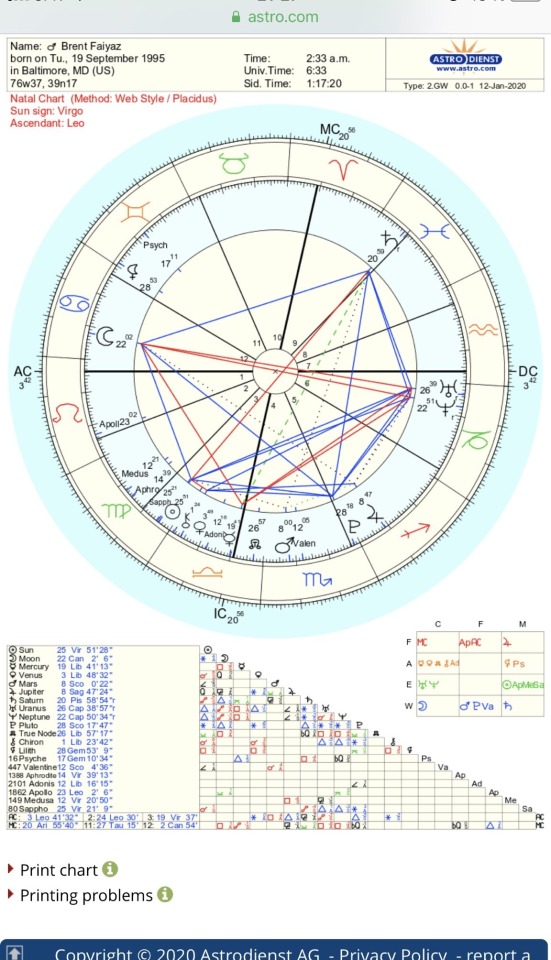
Brent is a Leo rising——his appearance shines bright like the sun and he currently has his hair that stands out like a lion’s mane
Apollo is Jupiter's son and an important asteroid in your personal birth chart, or as a factor in the horoscope 'weather' in your life as he passes through. Son of Jupiter Optimus Maximus (the greatest and best of Roman gods), Apollo was associated with the Sun.
More sun symbolism with asteroid “Apollo” on the Ascendant
Leo is ruled by the Sun so Brent’s chart ruler is chilling in his 3rd house of technical skills/communication/writing
Brent identifies himself as a creative song writer

Moon in Cancer or moon in its domicile—it operates well here, the only catch is that it resides in the 12th house of imprisonment.
Brent Faiyaz feels misunderstood when it comes to his inner self
He may feel lost often
Brent’s feelings, emotional responses, and habitual patterns are best expressed through ending old cycles and preparing for the new

Sun in Virgo at the 25°
The Sabian Symbol for the Sun is Virgo 25: A FLAG AT HALF MAST IN FRONT OF A PUBLIC BUILDING – this can speak of letting something go from your life – it can be a release of something, an abandonment, a death, moving on, feeling free to finally mourn, etc. It can also show a desire to do something really significant in the world – to have a mission.
Virgo is the analytical one, ruled by mercury the planet of communication.
Brent thrives when he is communicating—whether is through his music or through his writing!

Mercury in Libra in the 3rd house
Brent has the planet of communication in the house of communication, what are the odds?
Libra represents the lover, artist, and peacemaker
Brent Faiyaz is known for writing the most controversial lyrics but with an angelic voice.
That’s due to Libra being about balance—the “toxic” lyrics are balanced out with a beautiful voice

Libra Venus: Libra is the domicile of Venus
meaning, Libra is ruled by Venus and she is comfortable here.
Venus is the planet of love, pleasure, satisfaction, beauty, desire, artistic expression, etc.
Venus in the 3rd house:
In the area of life that represents technical skills, networking, learning & exchanging information, & ones immediate environment
Basically, Brent radiates beauty through his words.

Mars in Scorpio: Mars rules over scorpio—it’s comfortable here.
Scorpio is about deep, soul-level transformation. Scorpio is passionate, intense and perceptive.
In the 4th house of family, upbringing, roots, and heritage
Brent is part Dominican, btw
Faiyaz, whose father is part Dominican, chose Puerto Plata in an attempt to get acquainted with his roots. “I’m mad disconnected. I don’t speak no Spanish, none of that,” he admitted.
“The rampant poverty Faiyaz witnessed was a culture shock.”
https://www.latimes.com/entertainment/music/la-et-ms-brent-faiyaz-sonder-son-profile-20180404-story.html
Brent needs to feel deeply connected (Scorpio) to his heritage, family, & upbringing that’s why he put energy (mars) into getting familiar with his roots (4th house)

Jupiter in Sagittarius in the 5th house
The planet of luck, abundance, & expansion in the area of life described by good fortune, entertainment, & creativity
Brent is destined to be someone who is fortunate when it comes to writing & creating in a way that is aligned with his philosophies
@brentfaiyaz
#brent faiyaz#astrology#birth chart reading#birth chart#natal chart#zodiac#leo rising#cancer moon#virgo sun#libra mercury#libra venus#Scorpio mars#sagittarius jupiter#house astrology#music astrology
107 notes
·
View notes
Text
Blog Post 9
Interpret (through this blog) the most amazing thing you know about nature – get us excited. This is your blog – your audience isn’t out in the field with you so bring the field to your armchair reader.
Hello everyone, hope you had a great weekend and that your podcasts went well!
I really enjoy learning about nature, and one fascinating fact I'd like to share in this blog relates to plants! Did you know that scientists estimate there are over 400,000 species of plants on Earth, with at least half of them being edible for humans? It's mind-boggling to think that we potentially have access to around 300,000 plant species that we could consume. However, the reality is quite different. Our food choices are not solely based on taste and nutritional value; in fact, many of our most important crops are shockingly high in pollutants. Because of their hazardous qualities, several of these crops might even be prohibited from being consumed by humans if they were introduced today.
I distinctly remember the shock I felt when I first discovered this information. In a world with such an incredible diversity of plant life, I couldn't even name five plant species that I regularly eat. This revelation prompted me to dive deeper into the topic. What I found was both enlightening and practical: being edible doesn't necessarily mean something is "eatable." Many of these lesser-known edible plants either taste terrible, require specialized skills to prepare, or are so challenging to cultivate that they would cost a fortune to maintain.
I'm genuinely interested in hearing your thoughts on this subject. Have you ever come across this surprising fact before? Feel free to share your opinions and experiences in the comments. If you'd like to read more about this topic, you can check out the article I'm referring to by following this link:
I also recently learned a fact when it comes to studying the medicinal potential of plants. It's quite surprising that only a tiny fraction of plant species have been looked into for their healing properties. Particularly the rainforest holds a wealth of possible treatments for both modern and historical medical conditions. There's still so much we don't know, and this untapped resource might hold the answers to major medical breakthroughs. I had to work on an assignment about this, and it made me realize that scientists should absolutely keep digging into plant research. Time and time again, they've shown us that these remedies can be incredibly beneficial for our health. So, it's a no-brainer that we should continue exploring the incredible world of plants for our well-being. If you have any home plant remedies that are medicinal, please let me know! Have a great week everyone.
2 notes
·
View notes
Text
ISLAM 101: Basic Islamic Phrases: Part 4
Islamic Terms
Hijra: To migrate. This term refers firstly to the great migration of the Muslims in the year 622 from the hostile city of Mecca, which was controlled by idol-worshippers, to the safer city of Madinah (then called Yathrib) where Islam could exist freely. The Islamic calendar begins with the Hijra as the first year.
'Ibadah: This term is often translated as “worship” but it is not a correct translation. The word worship in English just means praying and bowing, like worshipping in a church. But the term 'Ibadah literally means “service” and it comes from the root word, “to serve.” When we say that Islam considers all life to be 'Ibadah, we mean that our whole life should be lived in the service of Allah. We are here to serve Allah. In Islam, any good deed, action or thought, even just holding a steady job or smiling at someone is considered doing 'Ibadah for Allah.
Iblees: Satan
Iftar: The meal you eat after sunset in Ramadan. Suhoor is the light breakfast before first light in the morning during Ramadan.
Ilm: Knowledge
Imam: Literally: leader. Although most Muslims take this term in the sense of a leader of the prayers, it does apply to the group leader outside of prayer as well. An Imam must be elected by the Muslims or at least accepted by them if he is appointed from outside. If the community rejects him, then he cannot be the Imam.
Eman: (Eemaan) Belief or faith. The root word of Eman is Amuna. It implies three meanings: 1) to believe, 2) to confirm that belief in your heart, and 3) to feel safe. Eman is what makes a person a Muslim. Often spelled “Iman”.
Ihsaan: Usually translated as “goodness”. The Prophet (p) defined it as knowing that Allah is watching you even though you don’t see Him.
Injeel: The Gospel of Prophet 'Esa (Jesus). The New Testament of the Bible is not the Gospel of Jesus. The New Testament was written by a lot of different authors well after Jesus went up to the heavens, and it contains stories about Prophet 'Esa, but it is not 'Esa’s message. The present New Testament was assembled three hundred years after the time of Prophet 'Esa by a group of white men on a Greek Island who voted on what their “holy” book should contain. Most of the votes were hotly debated! The Roman emperor who ordered them to do it then told all Christians to accept this new compilation of writings. All other Christian writings were ordered to be destroyed. The New Testament contains four books called Gospels: (Matthew, Mark, Luke and John). Hundreds more “Gospels” from other authors were burned. A few such as the Gospel of Barnabas and Thomas have survived. The Gospel of Jesus was never written down and is lost.
Insha'llah: If Allah wills something to happen only then will it happen.
Iqamah: The second call to prayer just before the actual prayer begins.
Islam: A submission to God. To surrender to Allah and find peace. To submit oneself TOTALLY to the lord.
Jahannam: Hell.
Jam'a: Together, in a group.
Jannah: Paradise, Heaven. It literally means “the Garden.”
Jibra'il: The angel that brought Allah’s revelation to the Prophet. Allah is so powerful and majestic that it is beneath him to reveal Himself to humans. We are like an ant next to a star in comparison to Allah. He sends the angels to do these small jobs, though He doesn’t need them. In English his name is Gabriel.
Jihad: A struggle
Jinn: These are another type of creature Allah created. They are invisible to us but they can see us. They were made from fire elements and thus are pure energy. They are not like ghosts or weird monsters. They can influence your thoughts, encourage you to do wrong, and whisper fears into your mind. They can be good or bad. The good jinn leave us alone. The bad ones, who are also called Shayateen, or Devils, want to destroy you. Astrologers and fortune tellers get their “predictions” and “readings"from them. Jinn spy on the Angels and learn secrets about the future, then they whisper it into the minds of the fortune tellers. Jinn live, die and have families like us but they exist on another plane altogether. The Prophets could control the Jinn but none of us ordinary people can. Although we believe Jinn can possess a human body, Islam teaches that it’s not very common. Don’t believe every “Jinn story” Muslim immigrants will tell you about their aunt or second cousin’s brother. Most of it will be superstitious stories that are culturally based.
Jumu'ah: The Friday Prayer in which all Muslims gather to hear a sermon called a Khutba. It’s time is in place of the Zuhr Salah, usually somewhere between 12 pm and 2 pm. It is mandatory on all men to attend. It is optional for women. The Prophet said if you miss three Jumu'ahs in a row then hypocrisy will start to enter your heart.
Kafir: People who conceal the Truth and actively plot against Islam. Usually we say the easier English word “unbeliever.” The plural is Kuffar. (Unbelievers.) The noun (unbelief) is Kufr.
Khalifah: This word means Steward, Manager or Care-taker. Allah made humans to be the Khalifah of the earth. In other words, we were given the earth as a trust to take care of. We shouldn’t ruin it or pollute it. The head of the Muslim Ummah is also called a Khalifah because he is to take care of the Muslim community. Muslims are supposed to elect a Khalifah, but there hasn’t been a world-wide Khalifah for a long time.
Khatib: The person who gives the Khutbah, or Friday sermon. The preacher during Friday services.
Kitabullah: The Book of Allah. (The Qur'an.) The word Kitab means book.
Mahr: The money (or whatever else) that the man has to give to a woman in order to marry her. It is called the marriage-gift and a woman can ask for whatever she wants. If it is money, it can be deferred and paid gradually over time. The husband can never take it away for any reason.
Malik ul Mawt: The Angel of Death.
Masjid: Literally means, “the place of bowing.” This is the name for a Muslim prayer hall or commonly known as Mosque.
Madhhab: This means, “School of Thought.” In Islam we have the Qur'an, the example of the Prophet and the sayings and guidance of the Prophet’s companions. Through the centuries, various Muslim scholars have tried to make those teachings easier for Muslims to live by through organizing them, talking about them and trying to use those tools to find answers to questions where those first three sources are quiet.
Of course different opinions developed between different scholars and some people chose to follow one scholar or the other. Those differences in ideas about how to follow Islamic rules are called “Schools of Thought.” There are 4 main schools today. Some people say you have to “follow” one of those schools to be a Muslim, but this is not true. You have to follow Islamic teachings but you don’t have to put some label on yourself. Each of the four schools is named after the scholar who founded or inspired it. The four are: Maliki, Hanafi, Hanbali, Shaf'i. The books and writings of the schools are a good source of information about the particulars of Islam, but our real label is, “I am a Muslim, and only a Muslim.” The Hanafi and Shaf'i schools are considered the easiest school and the Hanbali is considered the hardest in terms of social and personal rules.But they are all right in their own way and it is recommended to follow one in order to safe guard ones self from following ones own desires although it is not obligatory it is recommended.
Mecca: (Also spelled Makkah). A city in Arabia founded thousands of years ago by Prophet Ibrahim (Abraham). At that time it was called “Becca.” Prophet Muhammad, peace be upon him, was born there in the year 570.
Medina: (Also spelled Madinah). A city about 200 miles north of Mecca. The Prophet established the Islamic community there. He passed away there and is buried there.
Mu'adhan: The person who does the call for prayer.
Mujahid: A person who does Jihad or holy war.
Mu'min: A person with Iman(faith). A true believer.
Mus-haf: The Arabic text of the Qur'an. “Brother, hand me a Mus-haf.” (Qur'an with the Arabic in it).
Mushrik: A person who commits Shirk (making partners with Allah). Usually an idol-worshipper. A Hindu would be considered a Mushrik because they bow down to many idols and statues.
Muslim: A person who surrendered to Allah and is working at finding peace.
Nabi: This term means Prophet.
Nafs: This is often translated as “soul” but it really means “the self,” i.e. “You and only you.”
Naar: The fire (of Hell).
Nikkah: The Islamic wedding ceremony.
Niyyah: Intention
#Allah#god#islam#quran#muslim#revert#revert islam#convert#convert islam#converthelp#reverthelp#revert help team#help#islam help#salah#dua#prayer#pray#reminder#religion#mohammad#muslimah#hijab#new muslim#new revert#new convert#how to convert to islam#convert to islam#welcome to islam
3 notes
·
View notes
Note
What are your headcanons about Louis' childhood in the human au? He would totally be the teacher's pet and the kid who set alone and read a book during breaks imo. Or were his parents those kind of christians that homeschool their children so they god forbid learn about scary and dangerous things like evolution?
Ooh, human AU business!! I am obsessed with crafting childhood trauma for Louis, he has issues that need explaining
His parents immigrated from France for his dad's business endeavors, but he's never been there. Pretty much his whole life is in the NOLA gilded cage
He's the oldest with his sister being 18 months younger and Paul three years younger
The situation at home was...not ideal. His parents were extremely strict and should definitely have been divorced. Both were traditional Roman Catholics and his dad in particular was a pretty brutal disciplinarian. It was also very clear growing up that Paul was the favorite and his sister, Annette, was just as favored by their mother.
He was a very quiet, well-behaved child, never the squeaky wheel. This helped in some ways (less chance to be yelled at) but he also didn't get a lot of love or support growing up and his parents were hard on him. "Children should be seen and not heard" type of deal with a side of mandatory piety and masculinity
All of his schooling was at a super pretentious and traditionalist Catholic boy's school and he got a full classical education. He was extremely smart, but a B- student by high school because his already precarious mental health took a turn for the worse
Friends weren't much of a thing for Louis, he was definitely bookish and a loner. He loved to read and write and daydream, but it kind of sucked to have to. Fortunately, he was extremely close with his sister from the time they were tiny (more on that coming) so that helped some
He was outed at 16 because, being Those Parents, his mother took and read his journal. It did not go fucking well and his father's reaction is one of his worst memories. As a result of this, he definitely ended up being dragged to church to talk to a priest. Cue praying the gay away featuring unofficial "Christian counseling"
He kissed a boy at school once during a tutoring session, but immediately freaked out and ran off. That was the extent of his dating experience aside from some awkward dances with daughters of business partners his parents shoved at him
High school in particular was rough for him, and there was probably a little bullying, though family life was worse. He did end up with a very rich inner world though and did as much to educate himself as school did. He got really into self-improvement through culture and learning, both as a coping mechanism and a hobby. Obviously this trait grew more pronounced with time, but this is where the true Louis-isms started
15 notes
·
View notes
Note
Hello all! 🕊️
So, before I get into the jist of what I’m looking for, a bit about me! I am 23m, a literate to advanced literate roleplayer, I adore talking ooc. As for rules, please be 18+, please be at a similar writing level, and please tell me triggers or limits you have! As for NSFW, I can take it or leave it, so if you want it let me know! I also prefer to write on Discord, which will be at the bottom of the ask.
Now, for what I’m vibing: Mythology! Gods and Goddesses, pantheons galore! Oddly enough, this mythology kick is inspired by multiple sources, one even being an old Tumblr post! As for pantheon, I’m very familiar with Greek, Roman, Norse, Egyptian, and some Celtic and Slavic. However, I’m certainly willing to learn more if you want to throw in another god/pantheon, I always find it interesting to learn about others! Also, the gods we rp as don’t need to be from the same pantheon if you wanted to mix and match! Also, if you want to play a human instead, that’s totally ok!
With all that out of the way, now onto the plots in no particular order.
The god have died, killed by something, be it an entity or by being forgotten, and yet…divinity is hard to destroy. Reborn in new bodies, they slowly regain powers and memories over time. How do they change? Do some cling to their mortal identities, or despise them? Do they try to gain followers/revenge?
The gods of each pantheon exist, and though some ill fortune, the various gods are waging war upon each other, be it for control, worshippers, or the gods of good banding together to slay the wicked ones from all pantheons. A modified version of this could take place after a peace has been achieved. How have the pantheons changed? Is an understanding reached? Do gods from different pantheons/whatever lines were drawn band together for peace?
The one based off the Tumblr post (which I can share in dms, this is the trimmed down version of it). An alien invasion is destroying humanity. Their technology far surpasses everything and anything humanity can throw at them, though these beings from beyond have had humanity on the ropes, they are unprepared for the gods of various pantheons to reappear, to defend humanity and the world that is their dominion.
And honestly open to anything else if you have a plot you’re dying for, even more slice of life stuff! If you’re interested, my discord is Gozer99#3168 so feel free to dm me there!
Gozer99#3168
#oc x oc#1x1 rp#fandomless rp#dead dove#dead dove do not eat#18+#literate rp#spicy#discord rp#rp#roleplay
3 notes
·
View notes
Note
Hello all!
So, before I get into the jist of what I’m looking for, a bit about me! I am 23m, a literate to advanced literate roleplayer, I adore talking ooc. As for rules, please be 18+, please be at a similar writing level, and please tell me triggers or limits you have! As for NSFW, I can take it or leave it, so if you want it let me know! I also prefer to write on Discord, which will be at the bottom of the ask.
Now, for what I’m vibing: Mythology! Gods and Goddesses, pantheons galore! Oddly enough, this mythology kick is inspired by multiple sources, one even being an old Tumblr post! As for pantheon, I’m very familiar with Greek, Roman, Norse, Egyptian, and some Celtic and Slavic. However, I’m certainly willing to learn more if you want to throw in another god/pantheon, I always find it interesting to learn about others! Also, the gods we rp as don’t need to be from the same pantheon if you wanted to mix and match! Also, if you want to play a human instead, that’s totally ok!
With all that out of the way, now onto the plots in no particular order.
The god have died, killed by something, be it an entity or by being forgotten, and yet…divinity is hard to destroy. Reborn in new bodies, they slowly regain powers and memories over time. How do they change? Do some cling to their mortal identities, or despise them? Do they try to gain followers/revenge?
The gods of each pantheon exist, and though some ill fortune, the various gods are waging war upon each other, be it for control, worshippers, or the gods of good banding together to slay the wicked ones from all pantheons. A modified version of this could take place after a peace has been achieved. How have the pantheons changed? Is an understanding reached? Do gods from different pantheons/whatever lines were drawn band together for peace?
The one based off the Tumblr post (which I can share in dms, this is the trimmed down version of it). An alien invasion is destroying humanity. Their technology far surpasses everything and anything humanity can throw at them, though these beings from beyond have had humanity on the ropes, they are unprepared for the gods of various pantheons to reappear, to defend humanity and the world that is their dominion.
And honestly open to anything else if you have a plot you’re dying for, even more slice of life stuff! If you’re interested, my discord is Gozer99#3168 so feel free to dm me there!
_
5 notes
·
View notes
Note
In a fictional setting, how do you think Alexander would react to defeat? Let's say some guy, who wasn't a warrior, stood up to Alexander and said "You will not defeat us. We will not become slaves!" He's convinced everyone Alexander runs a slave state, and this is a fight against tyranny (not exactly true but it sells). Unlike Darius, he never retreats. In short if Alexander was defeated in battle, would this enrage him, or would he seek to recruit this person? What if the person said no?
Alexander and Resistance/Insurgency
This question is modern in some fundamental ways. That’s not a slam, but is an important point. It poses a situation that speaks to modern ideals rather than ancient conceptualizations.
Thing is, this happened quite a lot. It defines much of the conflict Alexander experienced in India as he moved down the Indus River. Also earlier, in Baktria-Sogdiana.
Alexander inevitably beat the crap out of the rebelling group, butchering anybody he perceived as a rebel. Why he won (however Pyrrhic the victory) is that he refused to give up, perceiving resistance to him as defiance that must be eliminated. It’s not a pretty picture.
So, let’s break down the question.
“Slave state” is a modern concept, and nothing like an abolitionist movement existed then.
Slavery was ubiquitous: so fundamental, ingrained, and assumed that slaves might own slaves, who might own slaves. By the Roman imperial period, slaves could be wealthy, especially skilled slaves. Generally, slavery was regarded as a result of ill fortune, disfavor of the gods, or even inherent inferiority (the beginnings of scientific racism, rooted in geographic determinism).
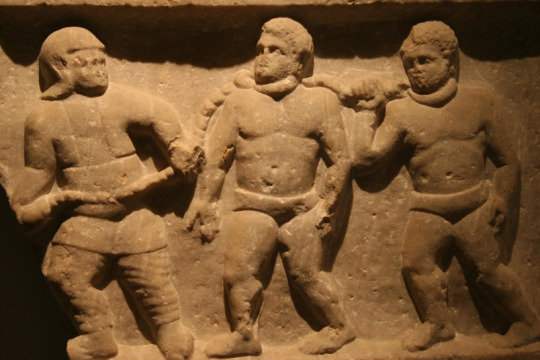
Did people want to become slaves? Of course not. Did entire populations resist conquest, choosing to die rather than become slaves? Absolutely. Was a fight against “tyranny” not used as a battle cry? It absolutely was.
But in ATG’s day, nobody would frame it as fighting a slave state. Even later slave revolts such as the Third Servile War [e.g., Spartacus’s Revolt] shouldn’t be understood as a philosophic fight against the institution of slavery so much as one slave who’d had enough. No “movement” arose from it. (Forget the 1960s Spartacus.)
The goal was to avoid becoming a slave yourself. It’s important to understand how resistance to conquest was framed. Claiming ATG ran a “slave state” would carry no weight. Everybody was a slave state, even if (by modern definitions*) that’s not technically true.
We know how ATG reacted to defeat: he viewed it as temporary—and made it so. We see this in sieges like Halikarnassos, Tyre. He just keeps pounding you. Not unlike Rome. Beat them and they come back, and beat you the next time. He learned from his defeats. As a battle commander, he was nothing if not agile. The worst defeat the army suffered was the massacre at Marakanda in Baktria (led by Spitamanes). In fact, he was mostly losing in Baktria, until he figured out why the resistance was occurring, then married his way to peace.
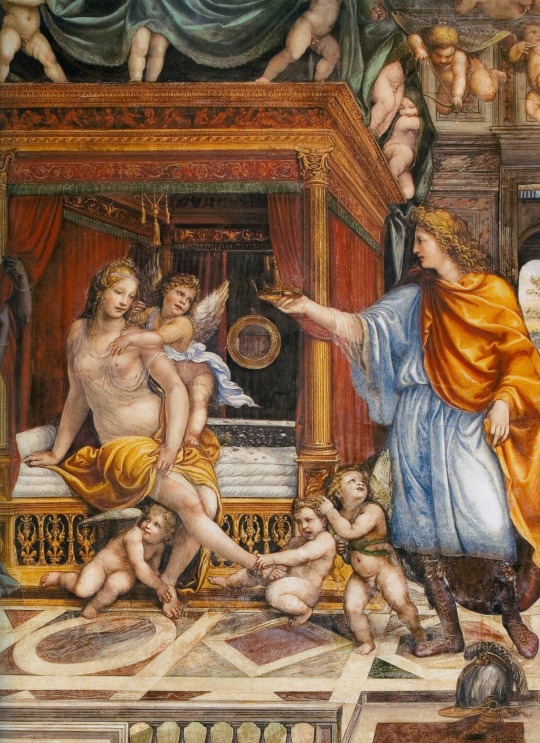
Ultimately he succeeded because he figured out how to win, then did whatever it took.
In India, things got even uglier. Lots of resistance as he made his way south down the Indus, especially from the Brahmins. He just mowed them down. But! If people surrendered, he granted clemency and didn’t kill them. That bad cop/good cop routine worked (mostly). But success was temporary. After his death (and perhaps even before), areas of India went back into revolt, with the (curious) exception of Poros, who he defeated at the Battle of the Hydaspes but subsequently befriended due to his bravery on the battlefield. BUT also because he surrendered.
This brings me to the concept of conquest and clemency. Equality was not a thing, even in a democratic state like Athens. It was still all about proving your exceptionalism. Ethnocentrism was universal and “Live and let live” not a concept most ancient cultures would have understood.
Yes, people regularly fought to maintain their freedom and independence, but loss was routinely interpreted as having the gods against you, and/or “natural” weakness. Victory meant “I’m better than you,” either due to divine favor or natural superiority. A sort of schoolyard mentality. Worth was proven by success. Alexander very much subscribed to this. He believed himself the son of Zeus-Ammon in part because he kept winning. Ergo, the gods were on his side.
Therefore, to quote Apollo 13, “Failure is not an option.”
Yet tucked inside all that—the inherent tension—was admiration for courageous resistance. This was also important to Alexander. He wanted to win a fair fight and have that acknowledged, as it meant (again) divine approval. If he felt somebody was cheating, or cowardly, he just got angry. This also defines his reaction to those who surrendered, only to resist later. To him, they’d broken a sacred contract.
And that brings me to Poros, why ATG went from War to Besties with the man. To Alexander, the conflict wasn’t personal, but about conquest, which meant, “We’re here to prove who’s better by right of combat.” When Porus fought bravely, lost, then surrendered: that was the script ATG wanted! Why? It let him be magnanimous in his victory. He returned Poros’s kingdom to him and added another kingdom as well!
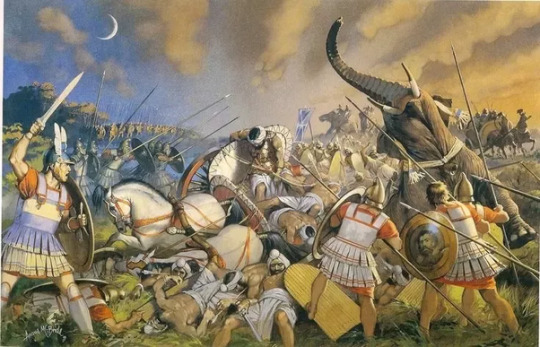
But note something here: who’s the giver? Alexander. That’s what clemency was: a grant of grace to somebody below you in the pecking order. This isn’t an alliance, no meeting of equals. Alexander GRANTS favors.
That means he cannot accept defeat. As long as he was on top, he wasn’t a terrible overlord, comparatively—assuming he cared enough to pay attention (his main failing as a ruler). But you may not resist (win). Victory = divine approval. Defeat = loss of divine approval.
Unacceptable!
At least some Indian nations figured this out pretty quickly and used it to their advantage. They discerned he was just sweeping through the region and had no plans to stay, so “surrendered” or claimed some connection to Herakles or Dionysos, flattered him, and he passed them by, maybe even gave them gifts. If the swathe he cut through the Indus Valley was often bloody, it wasn’t entirely bloody. Much depended on how the locals played him. Further, if prior Persian attempts to hold the Indus gave any example, they could “surrender,” pat ATG on the head, send him on his way…and he’d probably never be back to bother them again.
But in short, we have a lot of examples of the situation you outline here, and absolute defiance was always met by ruthless extermination. The further ATG went, the more resources he had to draw upon, so (as with fighting the Assyrian army) it was virtually impossible for smaller groups to stand up to his army. The Hydaspes was ATG’s victory in large part because of a discrepancy in troop numbers. He still fought a brilliant battle (maybe his most clever), but faced a much smaller army than at Gaugamela.
YET had he continued into India to face larger nations, he’d not have been so successful, imnsho. And even the fading glory of the divided Zhou Dynasty in China might have rolled him up and spat him out, with his much-reduced Macedonian core. He didn’t head back west for shits and giggles and a mutiny. He had good scouting, and Poros now on his side…whose fortune it benefitted to convince ATG to go back west. So, he cut his losses and marched south.
But this gives you some context for the question. Alexander both did not accept loss, and also had enough savvy to get himself out of—or avoid facing altogether—situations that he couldn’t win.
__________________________________
* In modern parlance, a “slave state” is one in which slavery is required for economic survival. Otherwise, it’s a state (or nation) that practices slavery. In the ancient world, due to the relatively small number of slaves per household in most places, plus a category of “serfs” (such as mushkênu in Mesopotamia), defining slave states is tough. There are some. Ancient Sparta was a slave state: without the helot system, it collapsed. Rome was a slave state. But most of ancient Greece was not, and certainly not ancient Macedonia. We might consider slavery key to certain professions: mining, prostitution, but it’s hard to argue the entire society would collapse without those slaves.
That said, east to west, south to north, slavery was everywhere. Nobody questioned it, they just wanted to own the slave, not BE the slave.
#asks#Alexander the Great#Alexander and defeat#clemency#conquest#slavery in the ancient world#Classics#tagamemnon#Resistance to Alexander the Great#Alexander the Great in India#Porus#Poros
14 notes
·
View notes
Photo
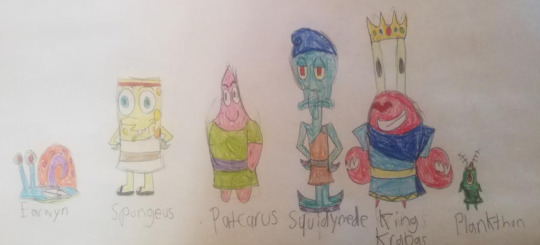
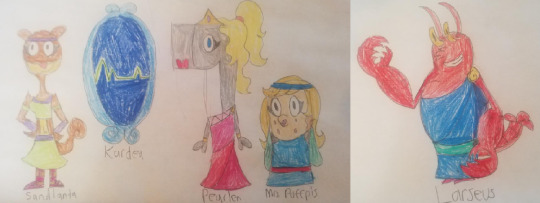
I have wanted to give out my very own Ancestry of the Main SpongeBob Characters since we've seen some BC, Medieval, and Western Counterparts. This time, these are Ancient Greco-Roman Ancestors of SpongeBob and his Friends as you can tell by the Similar characters wearing some Greek/Roman Clothing that I gave them. So let's meet our Main Characters that will soon have their Families' Future of their Current Descendants in the Present Time
Earwyn (Parody of Pegasus, Ancestor of Gary)
Earwyn is a Winged Snail, born from Winged Snails. He was once one of King Poseidon's slaves until Neptune nursed the Poor Snail into his Palace where he took Earwyn for Shelter for awhile. But when Earwyn chases a small urchin throughout the Hall and then outside, he becomes lost again as Earwyn was then later found by Spongeus and now became his current pet towards the Heroic Sponge. Plus, he even learns to fly and loves to eat food like his Descendant, Gary.
Spongeus (Parody of Perseus, Ancestor of SpongeBob)
One of the Most Famous Ancient Heroes, the Son the Sponge Princess, Danae. After when Danae met with One Random Fling, Spongeus and his Mother were once drifted off through the ocean and on to the shore of the Island of the Land, "Káto Méros" as they were rescued by a Fisherman and his Wife. Spongeus grew up in the City as the Sponge had many adventures involving around Heroic Training and even his Wild Bizzare Adventures involved around mostly the Roman Gods that is Neptune and his Family. Much like his Descendant, his very over the top Fun-Loving, Kind, Joyful, and Optimistic but also has a little deep mature side despite his silly behavior.
Patcarus (Parody of Icarus, Ancestor of Patrick)
A Dimiwitted Starfish that always runs through the Family. Patcarus is the most closest Best Friend of Spongeus and is the Son of a Glorius Craftsman Inventor who had to build up a Labyrinth for the Minotaur. Patcarus even dreams to one day have Wings so that way he'll be able to fly, fortunately that always gets ruined since he doesn't proberbly know how to fly in a proper way. Like his Descendant, he's very Lazy with a sense of Humor as he would end up serving himself as one of the Prisets of Bacchus, the Roman God of Wine.
Squidymede (Parody of Ganymede, Ancestor of Squidward)
Tenderly Handsome Squid fellow who moved from Troy to Káto Méros around Greece when he was a Child. Squidymede is often very grumpy with a dry sense of humor of his own but has his own beliefs of Music and Art. Sadly, runs in the Squid Family, Squidymede always gets the Shit throughout the Years for No Reason whatsoever for he wishes a life where he can have all the happiness and love that he deserves. Spongeus usually loves Squidymede but Squidymede, much like his Future Descendant, gets repeatedly annoyed by Spongeus' surroundings, especially if he's sometimes with Patcarus (Another Annoying Person that Squidymede can't stand).
King Krabas (Parody of King Midas, Ancestor of Eugene Krabs)
Greedy, Cheap, Hypocritical, Selfish but rather Kind and Friendly King he is, Spongeus and Squidymede are the King's servants. King Krabas is really obessessed with Gold since Childhood, in fact, he wanted everything around in his Kingdom to turn into Gold as his Servants would sell some Krabby Patties to the Customers in exechange for Gold. Krabas has a huge obessession with Gold, he cares less about his Servants, his People, and even his own Family. However, the only thing that he does truly love his Daughter, Pearlen. Krabas has even gone through many journies and adventures digging for Gold with his Old and New Serveants throughout his years.
Plankthon (Parody of Erysichthon, Ancestor of Plankton)
The Most Envious with Cruel and Malicious Jealousy of Tricks who's also the Arch-Enemy of King Krabas. Plankthon wanted to be the Main Ruler of King around Káto Méros but the Citizens of Káto Méros thought that Plankthon wouldn't work mainly because he was too small so that's why they chose Krabas instead. Long-time arch-rivals between Plankton and Crabs throughout Plankton and Krabs' Families, Plankthon kept on sworing for revenge as he even once tried to have all the food and the gold he could have but Ceres cursed him with replacements of Gold and Food into nothing but Chum.
Sandlanta (Parody of Atalanta, Ancestor of Sandy)
An Extreme Tough and Tomboyish Squirrel Girl who happens to be a Warrior around from Land to Sea. Sandlanta knew the Greek Gods, especially Zeus, in her Childhood back then as Animals around the Forest and even Humans upon Surface land would worship Greek Gods similar to how most of the Bikini Bottom Mortals would worship Roman Gods around their own religous beliefs. Sandlanta moved into the Sea where she discovered and learn the boundaries of the Ocean which made it into her Brand New Home. Sandlanta is one of Spongeus' Heroic Friends as she would go down hunting down Wild Beasts with Other Hunters as well as being one of the major allies of Diana.
Kardea (Parody of Medea, Ancestor of Karen)
The Mirror Wife of Plankthon who is his only company to keep him. After when Ceres cursed Plankton's life, Trivia once made a Magic Mirror for Good to teach each of the Fish Mortals how to be good with education. However, as it turns out, Kardea is not what she truly seems as she would often brainwashed Fish people into maing them do Bad Things. Trivia didn't know what might this come, so the Roman Goddess of Witchcraft decided to lock up the Mirror behind an Abandoned Kingdom where Plankthon currently lives now. Kardea helpd on Plankthon to get his own revenge on Krabas with Smart and Clever ideas. But...Much like towards Karen and Plankton's Marriage, they love/hate each other.
Princess Pearlen (Parody of Helen of Troy, Ancestor of Pearl Krabs)
The One and Only Daughter of King Krabas and Daddy's Little Girl. Pearlen is a very Naive, Dreamy, Sweet, and Free-Spirited Princess. Despite her Spoiled Behavior of a Typical Teenage Girl, she's often excited to taken her Father's Place one day when she becomes the Next Ruler of Káto Méros. Krabas even lets his own Daughter be with a Group of Girls around her own Age but she's also very Popular because she's the Daughter of a King. Sometimes, she gets tired of being Princess and would dream of nothing more but becoming more than just a Royal-Blood.
Mrs. Puffpis ((Her Last Name is a reference to an Ancient Greek Poet by the name, "Thespis"), Ancestor of Mrs. Puff)
Spongeus' Main Teacher in the School that he goes to, "Neptune Academy". Mrs. Puffpis teaches Spongeus the eductional learning ways behind History but also Math and Science as well as learning to how to write things. She becomes very paranoid when Spongeus does at least done mistakes in his own ways around School, which is quite similar is to how their descendants have that sort of kind of Relationships. Mrs. Puffpis would often suffer from stress and anxiety, especially if it's from too much work. Krabas even wanted to marry her to have her as his own Queen and even Stepmom to Pearlen but Puffpis is already married to her own Husband.
Larseus (Parody of Theseus, Ancestor of Larry)
Possibly one of the most popular heroes of all, Larseus seems to be a Nice Guy but he's also arrogant and inconsiderate. He's considered to be like a Jock who loves to play Sports as well as fighting down some Monsters and Beasts. He was mostly famous for slaying down the Minotaur with the help of Spongeus. Pretty much, he's a real famous guy as all the ladies around Greece in Káto Méros adored him very well. Though he's not really the Demigod Son of Neptune cause he's not really a demigod as some people assume but he is willingly to take down the hearts of Monsters with the help of his own cunning strength.
Sorry if Spongeus looks kinda derpy in this Pic, usually I'm more focused on MS Paint than just Paper (though Paper is sometimes more easier than drawing in MS Paint XP
SpongeBob SquarePants (c) Stephen Hillenburg
2 notes
·
View notes
Text
Tarot cards are a deck of symbolic cards that have been used for centuries to answer questions and provide guidance. They originated in the 15th century, but it is believed they were based on much older traditions. The Tarot was originally used in Italy as a game similar to poker or bridge, but with deep spiritual meaning. It wasn’t until the 18th century that Tarot cards began seeing widespread use as a tool for divining the future and understanding one’s purpose in life. In this video, you will learn about how Tarot cards have been used throughout history and what their origins are.
Roman Origins
The first known record of Tarot cards used in divination date back to the 15th century, when they were used in Italy. The game was played with a deck of cards very similar to what we have today. Worth noting is that early Tarot cards were not the illustrated cards used today. Instead, they were more like a regular playing card deck that had different symbols on each card. The major arcana cards that we are used to today did not come into existence until later in the 18th century. The origin of the cards themselves is a bit of a mystery. One theory is that they were brought to Italy from the Middle East during the Crusades. There is also evidence that the cards were created in China, then came to Europe or were created by Europeans who saw them.
18th-century France
The first known use of Tarot cards for divination occurred in the 18th century when French occultists began using them. One of the first uses was to foretell the French Revolution. The cards were trendy during the 19th century when they were used for many different purposes. They were used by scientists and philosophers, who were fascinated by the mystical and symbolic nature of the cards. The cards were also popular among the general public, who used them for fortune-telling and as a way to access their subconscious. The popularity of Tarot cards continued into the 20th century. Still, they saw a decline in the 1930s when other forms of fortune-telling became more popular, such as using the palm of the hand or astrology.
20th Century Revival
During the 20th century, there was a revival of interest in the Tarot, particularly in the United States, where there was a growing interest in all things metaphysical and spiritual. In the 1970s, there was another revival of interest in the Tarot, particularly among feminists and the counterculture movement. This revival was largely due to the writings of feminist author and activist Mary Daly, who wrote about the importance of the Tarot in her work “Beyond God the Father”. The growing interest in the feminist movement drew many people to the Tarot because they saw the cards as a way to connect with a female spirituality that mainstream religion had largely ignored.
In Conclusion
The Tarot is used by people all over the world today, though the ways in which people use them vary greatly. Some people still use the cards for fortune-telling, while others use them for self-development, creativity, and meditation. The cards can be an extremely powerful tool for accessing creativity because they allow us to tap into our subconscious mind. People can also use the cards to help them with decision-making, planning, and creative problem-solving. The best way to start learning how to use the cards is to get a deck and start reading the instructions that come with it. You can also find instructional books and online tutorials that will help you learn how to use the cards for various purposes.
If you liked this video please share it with your friends & family. We do appreciate it & thank you from Binbot Media.
#tarot cards#tarot#tarotcommunity#history#tarot reading#tarot deck#taroteverydamnday#tarotdaily#divination#tarotonline
2 notes
·
View notes
Text
May 6 — Asakusa
We started off our day at Asakusa, which was filled with stands, shops, and restaurants. After wandering the shops and purchasing a couple of blind box collectibles and a matcha latte, my friends and I met up with the rest of our group. Each of us got our own fortune by paying 100 yen and then shaking a container full of sticks, each with a number. Then we pulled out a stick, found the box with the matching number, and pulled out the first fortune in the stack. My fortune read, “The Final and Last Fortune,” which seemed very ominous. I was told it was worse than a regular fortune, but better than a bad fortune. At least I didn’t the worst one! Next, our group walked up the steps of the Senso-ji shrine, dropped a coin into a collection box, and joined our hands in silent prayer, ending with a bow. We repeated the process once we were inside.



Then it was lunchtime! My friends and I got udon to eat (a couple of us also got prawn tempura), which was amazing. I also tried barley tea for the first time! Three of my friends enjoyed an ice cream float of sorts, and then we met back up with the group to head to our next destination, the Fukugawa Edo Museum. At the Edo Museum, we were personally guided through a replica of a neighborhood from the mid 1800s, which was built to scale, interactive, and immersive through its audio and visual elements. We could hear rain falling, bells chiming, and cats meowing!





After our time at the Edo Museum, we had the rest of the day off. My friends and I located a park that we strolled around. We saw various animals like turtles there; it was very peaceful and quiet. After a little bit of downtime at the hotel, we walked to an area filled with arcade/gaming complexes, anime stores, and maid cafes. It was very crowded and more city-like, a stark contrast from the museum and park we went to earlier in the day. There, we walked around, ate sushi, went shopping in Don Quixote, and then headed home. Our first day in Japan and in Tokyo was an amazing, packed day!




Academic Reflection:
In “Contemporary Japanese Buddhist Traditions”, I was introduced to the basic aspects of Buddhism in Japan. Common activities include visiting temples, participating in rituals, receiving divinations, and purchasing amulets. Through today’s activities, I was able to witness and participate in a variety of rituals that sought to dispel misfortune and danger. At the Senso-ji shrine, I saw many locals gathered around an incense burner, wafting the smoke over their heads, and for some, even into their hair. This reminded me a lot of my own faith and the role that incense plays in it. I practice Roman Catholicism, and incense plays a large role in many of our rites on specific dates, such as solemnities or Good Thursday. I can see the potential influence of Asian belief systems’ use of incense on Catholicism’s, as trade likely spread it from China to the Roman Empire. In Catholicism, feeling incense on your head or any part of your body is seen to be a blessing from God. Therefore, I found it surprisingly easy to lean into partaking in this ritual.
In the reading, I learned a lot about the various aspects of Japanese Buddhism and how it has evolved. One thing that specifically stood out to me was how its demographic evolved and was broadened over time, specifically due to the influence of pop culture. Manga, anime, and characters/mascots all played a role in how Buddhism experimented and spread their teachings in order “to interact with a larger and younger audience and to make Buddhism relevant to the outside community”. This phenomenon of elements of media and pop culture being used to influence public attitudes and behavior was evident to me as many advertisements and instructions were communicated through engaging visuals with animated characters while we were navigating the subway system and choosing stores to shop in. Before utilizing the subway, our course director shared with us a Japanese graphic depicting animals and humans in a subway. The humans were covering their ears while the animals were shown to be speaking and/or yelling very loudly. This graphic reminded me of what I had read about experimental Buddhism, and I could therefore understand how a religion’s teachings could be effectively spread through manga and other forms of media.

1 note
·
View note
Text

In The Storm
“A mob quickly formed against Paul and Silas, and the city officials ordered them stripped and beaten with wooden rods. …Around midnight, Paul and Silas were praying and singing hymns to God, and the other prisoners were listening.” Acts 16:22, 25NLT
We’ve all read the story before of Paul and Silas being annoyed by a demon-possessed slave girl heralding who they were to everyone. Paul delivered her; the owners became angry. They lost their fortune-telling income. Hence the owners stirred up a riot.
City managers grabbed Paul and Silas for causing a riot. They had them beaten and thrown into prison. Now think about this, the Roman army was beating Paul and Silas. Roman soldiers half killed Jesus before He was hung on the cross. We can surmise that Paul and Silas weren’t just tapped but left with open bleeding wounds, gigantic welts, and reason to try to protect themselves from further damage.
Prison wasn’t a picnic like our prisoners have it today. They were changed to a wall— bowel movements happened where you were, as did urination. Gross, unsanitary, painful surroundings— AND — they sang, praising the Lord for the privilege of being beaten, with imprisonment.
Many saints have said to me— ‘praise Him in the storm, to see the victory.’
As I’ve gone through various storms in my life, I’ve come to see the truth of these words. The last episode in November found me in pain to the point of yelling out as my muscles spasmed around the tube inserted in my chest. Words of praise went up to Jesus in between— I was looking to the Only One who could release me. He in turn sent relief.
There’s so many personal, emotional nightmares which I dare not share unless I purposely want to hurt people. Suffice is to say— countless nights crying, praying, unable to sleep. Days crying, praying, ‘casting’ my burdens, (see 1Peter 5:7), hundreds of times daily— occasionally praising the Lord. Each praise was a “sacrifice of praise,” (see Hebrews 13:15). Some of the episodes lasted years.
Look how quickly Paul and Silas were loosed from their prison cell. V25 tells us there was an earthquake— in which no one in jail was killed. Prisoners stuck around after being freed. The jailer is asking “…"Sirs, what must I do to be saved?" V30. The next morning, (V3540) they were released from prison with the city officials apologizing unbelievably. Speedy answers came to their situation.
Mother learned this secret as she crossed over into being a senior citizen. She taught myself, children and grandchildren— ‘get those hands in the air and sing praises to the Lord. He deserves praise independent of how you feel or what’s going on in your world.’ Dad was crippled when Mom was 43. At Mom’s retirement Dad had a debilitating heart attack. Within four years Dad suffered Guillain-Barre syndrome, which almost clocked him out of life. Through it all Mom learned to depend on God for finances, strength, plus every facet of life.
Are you going through some stuff in life? Can you sing praises and worship to the Lord in the worst storms of life? Where our world is going we will HAVE TO praise the Lord to get through it. But on the other side— we’re going to see the power of our Lord and Savior. Will you make it? Be bringing the lost with you? It’s your choice. You choose.
LET’S PRAY: Sovereign Lord help us to realize the storms will increase our faith. Instead of mourning, whining, and complaining enable us to have the strength to praise even in the face of death, in the name of Jesus Christ I pray.
by Debbie Veilleux
Copyright 2023 You have my permission to reblog this devotional for others. Please keep my name with this devotional, as author. Thank you.
#Jesus Christ#lord of lords#word of god#Holy Spirit#God#it's your choice#devotional#storm#suffering#beating#power#no sleep#nightmare#emotional#love#hope#faith
0 notes